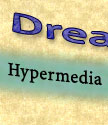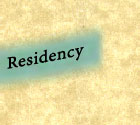|
| THE NO-GO ZONE Is theory a crystal ball? Is there any magic in theory? (Originally, the word meant "vision", which certainly suggests the mysterious.) Can Ontological/Anarchic Theory be used to predict the future like a Ouija board in some degree of that clarity with which it describes the present or "predicts" the past? Is specto-simulo-commodity-ism on its last legs, like "Marxism" in the 80's? What would cause it to collapse? What about "resurgent" Islam -- unifying ideology of the "South", or cultural death rattle? Religion in general? Various sci-fi scenarios? The Police as the final simulacrum of power, final organ of disappearance? Balkanization and ethnic cleansing? Is theory a zodiac we can skry? Can we make some New Year predictions, like the National Enquirer?
I don't see Capitalism vanishing overnight like Communism -- it's too organic, too closely linked up with "what's really going on". Marxism fell because it had entered a state of abstraction and denial -- failed to embrace the Spectacle as the true site of power -- but Capital didn't make this mistake. Capital will disintegrate or deliquesce, rather than undergo sudden implosion. The signs of disintegration will become more and more obvious to experience and theory, but will not erase the simu lacrum of the totality with any "revolutionary" collapse. The murky clouds in the crystal are starting to drift and clear. Suddenly, a concept: social triage. And immediately a corollary: the no-go zone. The state, as the last spectacular locus of the world of simulation, will be forced to practise social triage, letting go of real control over zones which fall beneath the level of adequate involvement in the empty discourse. Zones: classes, races, marginalized groups, and to some extent actual geographic areas. Triage: gradual and imperceptible letting-go of "services", leading to the emergence of no-go zones where "control" is reduced to purely simulated means (e.g. TV as social glue). Zones which have been economically abandoned (the homeless, small farmers, migrant workers, "welfare classes") will gradually be eliminated from all other networks controlled by the spectacle of the state, including the final interface, the Police. Officially of course this policy will not exist and the specto-state will continue to claim jurisdiction and proprietorship of these zones -- no political autonomy will be permitted, and occasional terror acts will be broadcas t in the spectacle to provide a veneer of control-simulation. But in stark economic reality these zones will have been sacrificed, like passengers thrown out of the troika of History to the wolves of Memory. Inasmuch as this process is already under weigh, the study of demographics provides a clue to the future: -- where are the classes leaving, where are they going? Mike Davis has analyzed this movement in the microcosm of Los Angeles, where a complex pattern of triage and terror has already emerged to prove him a prescient prophet, whose brand of geomancy reads the bones of buildings and entrails of urban space rather than "natural" features of animals or landscape. (Inasmuch as "culture&qu ot; has an unconscious it disgorges magic signs and symbols -- not the smoke of burnt offerings but of burning cop cars.) I believe this process will speed up to the point where it will be quite obvious, in 5 to 10 years, that portions of "America" are no longer on the map. They will produce no "growth", neither will they "consume", and they will no longer be serviced by any of the spectacle's vanishing bureaux -- IRS, Healthcare, military/ police, social security, comm unication and education. These areas (economic/social/geographic) will cease to exist for all practical purposes of control. The consuming classes will leave these areas and move "elsewhere", either socially or geographically or both simultaneously. Having been seduced by the commodity, we will be abandoned by it or rather, "they" will be abandoned, the alien others who were never really part of it in the first place. Interestingly, however, this "them" will gradually come to include more and more individuals and groups who now think of themselves as "us" -- the heirs of that great Bourgeois Rational sun-lit world which the spectacle still simulates and preserves -- the ones with "rights", the ones who are "safe" and destined to "survive". Triage will be practised in these zones as well. The cracks in the monolith will widen, and a lot of "us" will miss that last helicopter out of town. I could move to Boulder or Portland now, hang on to my rentier status, survive as a licensed clown on the margin of the spectacle -- and believe me the temptation is real enough. And indeed the "South" is (or will become) the body, the realm of everything which is not pure spirit and information, everything heavy and mortal -- the realm of agriculture and industry -- the dark last vestiges of the neolithic -- of production (that crude demiurgic barrier to the free mutagenesis of significance and the free exchange of emblems and images -- of pure information). The South will supply "us" with microchips and soylent green, so we can all jack into virtual reality and download our consciousness (what a relief!) into the software. The information economy may have already begun to cut its ties with the material economy -- it's not at all clear that certain kinds of "money" retain any link -- even a symbolic link -- with actual social wealth. This is "virtual" money. In the context of specto-simulo-capital this money is hyperreal, and thus seems more powerful than money which is merely real and still tied to the "material bodily principle." In this scenario we can finally "let our servants live for us" (Maldoror) while we go on and rise up to something better. The machine is not our servant (as some old sci-fi authors believed) but rather our symbiont. Our servant is the South. So part of the North disappears into Cyberspace, leaving the other part deserted and bereft, no-go zones, cracks in the monolith. What could be more natural than this: -- that the South will interpenetrate the North like mycelia in a loaf of bread? The holes and cracks in the North will become more Southern, more African, more Latino, more Asiatic, more Islamic. (P.K. Dick, a true Gnostic visionary, seems particularly prophetic on this point.) Now the crucial question: is it possible to imagine the no-go-zone fulfilling a liberatory function? (in any way other than as a reversion to primitive warfare interesting perhaps to a few Neitzschean Vikings?) --that is, do the NGZ's play any necessary role in the emergence of the Temporary Autonomous Zone or even the Permanent Autonomous Zone? Does the NGZ represent -- in some weird paradoxical way -- the rebirth of the possibility of the social? Forget political autonomy -- no Republic of the South Bronx or Free State of Western Wisconsin no Libertarian enclaves or anarchist liberated zones, no Ecotopia, no New Afrika, etc., etc. The spectacle (even in its last gasp) will ruthlessly destroy anyone who threatens its monopoly of spectacular authority. The TAZ, the clandestine time/space society of the festival provides a much more realistic model for the NGZ's than the model of micronationalism. The important thing is not postage stamps or flags -- the image of freedom (freedom as commodity) -- but the reality of freedom on the level of everyday life. We can forego the emblematism of power for the possibility of power over our destinies (or at least of unmediated failure!). The sine qua non for the NGZ as a possible locus for liberation consists of the implementation of an economy adequate to this function; and the implementization of such an economy depends (at least in part) on an idea of the social. So far neither of these stages has emerged in any but the crudest preliminary outline -- so here we shift the burden of this text from prediction to prescription. We'll try to imagine what we could do right now -- to turn the NGZ's into autonomous zones, and snatch our freed om even in "hell" even from the Lord of the Flies. Is it possible to picture an economy for the NGZ's which would relate somehow (in countless and complex ways) with the economy of the South -- which is already beginning to appear in marginal areas of the North where control is shaky? I'm not at all sure what this would mean, but picture an advanced and "borderless" stage of bricolage , not just of things but of entire systems and fragments of systems. I envision an alternative communications system, self-organized and non-hierarchic -- what I call a "web" rather than a "net" -- which might make use of some "cyberpunk" ideas, but only the poor ones and the rough ones (and really, fuck "cyberspace" -- I'd rather live in New Jersey!), I see not only "black work" (lavoro nero , a fine art in Italy) but also "black service", "black production" and "black exchange" used in "alternative" (but not purely PC) technology. I suspect we'll have a technology more human than "green", more concerned with farming or permaculture and low-tech adhocism than with wilderness and deep ecology.
To speak of such models however brings up the question of the idea of the social, which is (according to a very loose categorization) either political or "religious". We've assumed that the NGZ has abandoned -- or been abandoned by -- the political. Can it be that the idea of the social appropriate to the NGZ is "religious" in nature? I mention this for two reasons: (1) religion has not gone away, as predicted by Rationalism, and (2) religion has proven to be a powerful source for social cohesion, for example, in the history of intentional communities -- more powerful than political ideology or utopian planning. I hypothesize the possibility and reality of non-authoritarian, autonomous, self-organized, non-hierarchic aspects of the huge complex subsumed in the word "religion" -shamanism, for example, or the multivalent and infinitely expandable pattern of "paganism", in which no culture can gain a monopoly of interpretation, or even a hegemony. I'm thinking of certain old European genre paintings which always fascinated me as a child, depicting peasants or gypsies living in the ruins of some vanished empire -- usually Roman. The images appealed to a Bachelardian sense of reverie and magic about certain kinds of "home", certain kinds of "space". I like the sense of abandonment implied in the paradox of abandoned ruins brought to life by "abandoned" bohemians, low-lifes, Breughelian fiddlers and dancers -- the contrast of the heavy remains of vanished triumphalism with the lightness and brightness of nomads. I may very well be romanticizing the NGZ as a possible utopian topos or site -- but then again, I might be inclined to defend the occasional usefulness of romanticism: -- it beats despair. The NGZ is on the way, whether we dread it or romanticize it.
|
|
|

















